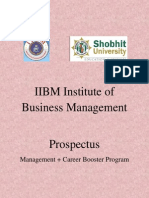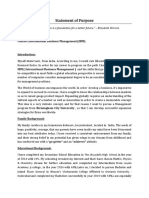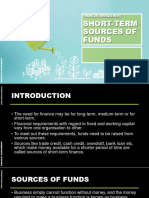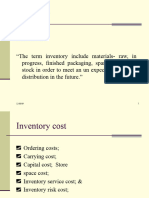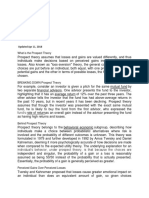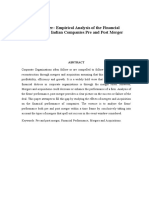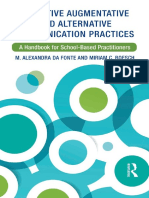Master of Foreign Trade Top Colleges, Syllabus, Scope and Salary
Master of Foreign Trade Top Colleges, Syllabus, Scope and Salary
Uploaded by
Shruti AshokCopyright:
Available Formats
Master of Foreign Trade Top Colleges, Syllabus, Scope and Salary
Master of Foreign Trade Top Colleges, Syllabus, Scope and Salary
Uploaded by
Shruti AshokOriginal Description:
Original Title
Copyright
Available Formats
Share this document
Did you find this document useful?
Is this content inappropriate?
Copyright:
Available Formats
Master of Foreign Trade Top Colleges, Syllabus, Scope and Salary
Master of Foreign Trade Top Colleges, Syllabus, Scope and Salary
Uploaded by
Shruti AshokCopyright:
Available Formats
Master of Foreign Trade Top Colleges,
Syllabus, Scope and Salary
MFT in Foreign Trade is a postgraduate course in Foreign Trade Management. Executive
Management:
covers foreign trade or international trade, which:
is also known in India as the as the Import-Export domain.
is an exchange of capital, goods, and services across international borders or territories.
represents a significant share of gross domestic product (GDP).
is the export of all goods and services to foreign countries.
is the import of all goods and services to the home country.
is an extension of the production, exchange, and consumption.
is essentially the exchange of goods and services between countries.
The products used for Foreign Trading are very similar to other products being produced
around the world. As such, these products are referred to as ‘Commodities’. When trading of
Commodities occurs, it is known as Commodity Trading.
In this process, commodities are often pooled together in one mass market and sold, thereby
linking the producers of the commodities effectively with their commercial consumers.
Commodity Trading mainly takes place in the commodity markets where raw or primary
products are usually exchanged.
Foreign Trade in India is administered by - The Directorate General of Foreign Trade
(DGFT), an agency of the Ministry of Commerce and Industry of the Government of India.
Aspiring candidates need to have completed graduation in a relevant subject from a
recognized university, with a minimum aggregate score of 50%.
Such postgraduates are hired in capacities such as:
Foreign Trade Zone Operator
Global Trade Manager
Foreign Trade Zone Analyst
Senior FX Trading Strategist
Foreign Exchange Trade Settlement Specialist
Coordinator
Foreign Trade Payables Specialist
Foreign Trade Representative
Support Trader
FX Trading Platform Business Analyst
Researcher, etc.
The average tuition fee charged for the course in India ranges between INR 10,000 and 20
Lacs for a span of 2 years.
In India, Foreign Trade postgraduates on an average are offered an annual salary ranging
between INR 2 and 4 lacs, increasing with experience and skillset.
Master of Foreign Trade: Course Highlights
Listed below are some of the major highlights of the course.
Course Level Post Graduation
Duration 2 years
Examination Semester System/Year wise
Type
Eligibility Graduation from a recognized university
Admission Based on performance in sentrance exam
Process
Course Fee INR 10,000 to 20 Lacs
Average Starting INR 3 to 12 lacs per annum
Salary
Top Recruiting Infra, ICICI Pru, Cashpor Microfinance, Optima Insurance, Bharti Airtel, HCL Infosystems L
Companies Tata Steel, TCS, HSBC Bank, HT Media Ltd., etc.
Top Recruiting Export Units, International Trade Regulatory Bodies, Export Promotion Councils, Buying H
Areas Department of Multinational Companies, Trade Regulatory Bodies, MNCs Departments, Res
Institutions, Engineering Goods Companies, Custom Clearing Houses, State Trading Corpor
or Companies, and such.
Job Positions Foreign Trade Zone Operator, Global Trade Manager, Foreign Trade Zone Analyst, Senior F
Foreign Exchange Trade Settlement Specialist, Coordinator, Foreign Trade Payables Special
Representative, Support Trader, FX Trading Platform Business Analyst, Researcher, among
Master of Foreign Trade: What is it About?
Foreign Trade, also termed as International Trade, is relevant since,
It is the exchange of goods, capital and services across international borders and
territories.
Generally, no country can produce all the goods & services that it requires.
goods that are unavailable or available in insufficient quantities need to be imported.
Similarly, goods that are excess in quantity need to be exported to other countries.
Through exchange of products, the world is able to not only meet its need, but also profit
from it as well.
The course essentially aims to:
develop an international networked competitive business and research for individuals,
corporate, government, and society.
globally strengthen, sustain, and professionalize business knowledge through creative
research, learning, and teaching.
exchange mutually beneficial information with organizations, institutions, and universities
in the country, as well as internationally.
Top Institutes offering Master of Foreign Trade
Listed below are some of the top institutes in India that offer the course.
Name of Institute City
Indian Institute Of Foreign Trade New Delhi
KJ Somaiya Institute of Management Studies and Research Mumbai
Symbiosis Institute Of Management Studies Pune
Fore School Of Management New Delhi
Loyola Institute Of Business Administration Chennai
IFIM Business School Bangalore
Birla Institute Of Management Technology Greater Noida
CMS Business School, Jain University Bangalore
Fortune Institute Of International Business New Delhi
Symbiosis Institute Of International Business Pune
International School of Business and Research Bangalore
Motilal Nehru National Institute of Technology Allahabad
Indian Institute of Foreign Trade Kolkata
Institute Of Public Enterprise Hyderabad
Faculty Of Management Studies, Banaras Hindu University Varanasi, Uttar Pradesh
Cochin University of Science and Technology Kochi, Kerala
M.S. Ramaiah Institute of Management Bangalore
Pondicherry University Pondicherry
GIBS Business School Bangalore
PSG Institute of Management Coimbatore
Eligibility for Master of Foreign Trade
Candidates aspiring for admission to the course are required to fulfil the following minimum
eligibility criteria.
Graduation completed in any stream, from a recognized educational Board.
A minimum aggregate score of 50% (45% for SC/ST/OBC candidates) at the level of
graduation.
Master of Foreign Trade: Admission Process
Most institutes offering the course in India admit students based on their performance in a
relevant entrance test, followed by a subsequent round of counselling.The round of
counselling consists of two additional rounds of Group Discussion and Personal Interview,
wherein the candidate’s general aptitude for the course is examined.
You might also like
- Rajan Saxena - Marketing Management (2015, MC Graw Hill India)Document850 pagesRajan Saxena - Marketing Management (2015, MC Graw Hill India)Nancy Angel100% (3)
- NCP Altered ComfortDocument2 pagesNCP Altered ComfortColleen De la Rosa50% (2)
- IIFT Information Brochure MBA (IB)Document16 pagesIIFT Information Brochure MBA (IB)AnweshaBoseNo ratings yet
- Courses and DetailsDocument8 pagesCourses and Detailsapi-19649851No ratings yet
- Indian Institute of Management AhmedabadDocument11 pagesIndian Institute of Management AhmedabadmitanshNo ratings yet
- IIBM Shobit ProspectusDocument17 pagesIIBM Shobit Prospectusmohamedsaleem24No ratings yet
- Indian Institute of Foreign Trade: Integrated Programme in Management (IPM)Document46 pagesIndian Institute of Foreign Trade: Integrated Programme in Management (IPM)RishabNo ratings yet
- Iift 2024 I PM ProspectusDocument24 pagesIift 2024 I PM ProspectusVenom ChechesNo ratings yet
- Information Sheet 2019Document4 pagesInformation Sheet 2019shalini priyaNo ratings yet
- Course Curriculum: Mba: IbDocument94 pagesCourse Curriculum: Mba: IbRamachandranNo ratings yet
- Epgdibw2022 23Document14 pagesEpgdibw2022 23Rajan SinghNo ratings yet
- MA (Economics) : Specialisation in Trade & Finance 2024-26Document19 pagesMA (Economics) : Specialisation in Trade & Finance 2024-26varun39954No ratings yet
- Dakter Bhai WordDocument67 pagesDakter Bhai WordAkib SiamNo ratings yet
- 53 - Finance Litracy Knowledge and IntellegenceDocument2 pages53 - Finance Litracy Knowledge and IntellegenceElvis OlotonNo ratings yet
- Program For Great Career in International BusinessDocument5 pagesProgram For Great Career in International Businessajeet sharmaNo ratings yet
- Categorisation of The Top 90 BDocument6 pagesCategorisation of The Top 90 Bzrd_12No ratings yet
- ICRM 2013 - IIT Delhi - 21 - 22 Dec, 2013Document2 pagesICRM 2013 - IIT Delhi - 21 - 22 Dec, 2013Sai BabaNo ratings yet
- Analysis of FDI in Multi-Brand Retail in India: FORE School of ManagementDocument35 pagesAnalysis of FDI in Multi-Brand Retail in India: FORE School of ManagementdeepanshuchandraNo ratings yet
- Global MBADocument6 pagesGlobal MBAomkar nadavadekarNo ratings yet
- Employees MotivationDocument66 pagesEmployees MotivationArun Kumar67% (3)
- JmarathonDocument45 pagesJmarathonSOURADIPA KANJILAL100% (2)
- Monu's ProjectDocument74 pagesMonu's Projectyadav192No ratings yet
- Branding of Corporate Bridge Through Internet MarketingDocument56 pagesBranding of Corporate Bridge Through Internet MarketingSapna SharmaNo ratings yet
- SOP Manjot Kaur Master of Business Administration TorrensDocument7 pagesSOP Manjot Kaur Master of Business Administration Torrensneha bholaNo ratings yet
- Report SIPDocument42 pagesReport SIPRishab GuptaNo ratings yet
- To Study Customer Relationship Management in Big BazaarDocument45 pagesTo Study Customer Relationship Management in Big BazaarAbhi KengaleNo ratings yet
- Outlook B SchoolsDocument103 pagesOutlook B SchoolsVaishali GaggarNo ratings yet
- My Name Is Farhan JavedDocument2 pagesMy Name Is Farhan JavedADeel ChNo ratings yet
- Project Report: THE B.B.A PROGRAM (2017-20)Document36 pagesProject Report: THE B.B.A PROGRAM (2017-20)JantuNo ratings yet
- Gmat Score - IndiaDocument9 pagesGmat Score - IndiavenugopallNo ratings yet
- Loyalist College - GBM - Ishan ThakkarDocument4 pagesLoyalist College - GBM - Ishan ThakkarKhushwant Competitive Careers Pvt LtdNo ratings yet
- Paper On Management education-Dr.K.S.Chandrasekar and Siva Prakash CsDocument6 pagesPaper On Management education-Dr.K.S.Chandrasekar and Siva Prakash CsSiva PrakashNo ratings yet
- Iim Culcutta - Marketing BroucherDocument4 pagesIim Culcutta - Marketing BroucherStrategyworld HRNo ratings yet
- Education Sector in IndiaDocument51 pagesEducation Sector in IndiaSagar ShettyNo ratings yet
- A Project Report of Gourav SharmaDocument43 pagesA Project Report of Gourav Sharmashubhamgaa39No ratings yet
- Study PlanDocument4 pagesStudy PlanMahir Hussain100% (1)
- Ingenious Eligible CollegesDocument2 pagesIngenious Eligible CollegesprimeshutterNo ratings yet
- Preetu - Procurement Process at Shopfront Limited - Rubbaiyat Jahan Preetu 170061068 - Rubbaiyat Jahan Preetu 170061068Document48 pagesPreetu - Procurement Process at Shopfront Limited - Rubbaiyat Jahan Preetu 170061068 - Rubbaiyat Jahan Preetu 170061068Mr PrajwalNo ratings yet
- Project Report (Taywade)Document10 pagesProject Report (Taywade)ImtiyazAli SiddiqueNo ratings yet
- International Management InstituteDocument10 pagesInternational Management InstituteRaghaNo ratings yet
- PROSPECTUS (2020-2023) : Weekend Programme New DelhiDocument21 pagesPROSPECTUS (2020-2023) : Weekend Programme New DelhiDEV DNo ratings yet
- Iim Shillong Working Executive MbaDocument14 pagesIim Shillong Working Executive MbaUdit ShardaNo ratings yet
- Noida FPM Brochure 2020Document27 pagesNoida FPM Brochure 2020Sharad MallNo ratings yet
- Moni GuptaDocument100 pagesMoni GuptaTasmay EnterprisesNo ratings yet
- Ph.D. Programme 2011: (Part Time and Full Time)Document14 pagesPh.D. Programme 2011: (Part Time and Full Time)Sankha GhoshNo ratings yet
- Atul FinalDocument61 pagesAtul Finalsinghrahul50210No ratings yet
- Sample SOP QuestionnaireDocument3 pagesSample SOP QuestionnaireTRUSHAL VEKARIYANo ratings yet
- Career Counselling For Class XIDocument39 pagesCareer Counselling For Class XIRaj SharmaNo ratings yet
- Abdul Sami SOP For Birmingham City UniversityDocument4 pagesAbdul Sami SOP For Birmingham City UniversitySahas Yuvaraj100% (1)
- FMCG Sector AnalysisDocument56 pagesFMCG Sector AnalysisnishthapatangiaNo ratings yet
- Mba Sop SampleDocument2 pagesMba Sop SampleRajshreyash AdhavNo ratings yet
- Departmental Store (Eng)Document32 pagesDepartmental Store (Eng)AnilGoyalNo ratings yet
- New Microsoft Word DocumentDocument28 pagesNew Microsoft Word Documentjaz143No ratings yet
- Block 4Document129 pagesBlock 4msk_1407No ratings yet
- Itm Executive PGDM: (An Aicte Approved Program)Document12 pagesItm Executive PGDM: (An Aicte Approved Program)shrikollamNo ratings yet
- Project On Online TradingDocument133 pagesProject On Online Tradingshivamcim33% (3)
- Business Management Solutions: Practical Steps for Solving Problems in Your BusinessFrom EverandBusiness Management Solutions: Practical Steps for Solving Problems in Your BusinessNo ratings yet
- CFA level I Exam Companion: The Fitch Learning / Wiley Study Guide to Getting the Most Out of the CFA Institute CurriculumFrom EverandCFA level I Exam Companion: The Fitch Learning / Wiley Study Guide to Getting the Most Out of the CFA Institute CurriculumNo ratings yet
- Sources Short Term FinanceDocument29 pagesSources Short Term FinanceShruti AshokNo ratings yet
- InventoryDocument13 pagesInventoryShruti AshokNo ratings yet
- St. Joseph'S College of Commerce: Post Graduate DepartmentDocument22 pagesSt. Joseph'S College of Commerce: Post Graduate DepartmentShruti AshokNo ratings yet
- Annexure CD - 01'Document8 pagesAnnexure CD - 01'Shruti AshokNo ratings yet
- Eun7e CH 009Document33 pagesEun7e CH 009Shruti AshokNo ratings yet
- Banks RM ProductsDocument20 pagesBanks RM ProductsShruti AshokNo ratings yet
- Rospect Theory: Reviewed by James ChenDocument14 pagesRospect Theory: Reviewed by James ChenShruti AshokNo ratings yet
- COC1Document11 pagesCOC1Shruti AshokNo ratings yet
- Factoring Vs ForfeitingDocument27 pagesFactoring Vs ForfeitingShruti AshokNo ratings yet
- Empirical Analysis of The Financial Performance of Indian Companies Pre and Post Merger 2Document21 pagesEmpirical Analysis of The Financial Performance of Indian Companies Pre and Post Merger 2Shruti AshokNo ratings yet
- Initial Public Offer (Ipo)Document30 pagesInitial Public Offer (Ipo)Shruti AshokNo ratings yet
- The Euromarkets1Document22 pagesThe Euromarkets1Shruti AshokNo ratings yet
- Welder Qualification N Control ProcedureDocument11 pagesWelder Qualification N Control ProcedureMasood Ul Hasan Khan100% (1)
- Construction Safety Checklist - EnglishDocument3 pagesConstruction Safety Checklist - EnglishTheodore Teddy KahiNo ratings yet
- LESSON 1 Teaching English in Elem GradesDocument8 pagesLESSON 1 Teaching English in Elem Gradesbaunsit.josepharnold.mccNo ratings yet
- 90-Day ChallengeDocument8 pages90-Day ChallengeShaharyar AsifNo ratings yet
- Study Guide For MGR Exam 2 PDFDocument10 pagesStudy Guide For MGR Exam 2 PDFRandyNo ratings yet
- Quirk - A University Grammar of EnglishDocument249 pagesQuirk - A University Grammar of EnglishRocio100% (1)
- Health Problems VOCABULARYDocument2 pagesHealth Problems VOCABULARYArlet MoralesNo ratings yet
- Geography BA Syllabus ND BooksDocument45 pagesGeography BA Syllabus ND BooksSohail Ahmad63% (16)
- English 7 Q1 Quiz 2Document2 pagesEnglish 7 Q1 Quiz 2Angelica JessaNo ratings yet
- Soal Historical Recount 22Document7 pagesSoal Historical Recount 22pineNo ratings yet
- Article of FaithDocument9 pagesArticle of FaithStoryKing100% (2)
- Unit 11 Research Project - LO1 ExampleDocument8 pagesUnit 11 Research Project - LO1 ExampleAsif Abdullah KhanNo ratings yet
- Language Culture and ThoughtDocument24 pagesLanguage Culture and ThoughtLý Hiển NhiênNo ratings yet
- 3-7 Lesson PlanDocument4 pages3-7 Lesson Planapi-628801158No ratings yet
- Positive Aspects of Phil. ValuesDocument13 pagesPositive Aspects of Phil. ValuesJaymar MagtibayNo ratings yet
- Jaime Escalante How To Teach Math 071609Document17 pagesJaime Escalante How To Teach Math 071609whvn_havenNo ratings yet
- Ohio State's Three-Deep Coverage PrinciplesDocument3 pagesOhio State's Three-Deep Coverage PrinciplesMichael SchearerNo ratings yet
- Grammar There Is, There Are 2021-1Document5 pagesGrammar There Is, There Are 2021-1luis arevaloNo ratings yet
- Benchmarking of Oneplus-76Document11 pagesBenchmarking of Oneplus-76Hemasri ChinnuNo ratings yet
- 2 Models of SuzukiDocument15 pages2 Models of SuzukishhanoorNo ratings yet
- Lecture 1Document5 pagesLecture 1Hanne Zeshield MierNo ratings yet
- Effective Augmentative and Alternative CommunicatiDocument64 pagesEffective Augmentative and Alternative CommunicatiAnelia CibuNo ratings yet
- Creative Nonfiction Exam WeaponDocument3 pagesCreative Nonfiction Exam WeaponAlfred Abay-abayNo ratings yet
- Eca Ebola Report Final Eng PDFDocument86 pagesEca Ebola Report Final Eng PDFTina chackoNo ratings yet
- JRFP2020 Policy ManualDocument13 pagesJRFP2020 Policy Manualfabyan17No ratings yet
- Jeopardy - Dna Rna and MitosisDocument27 pagesJeopardy - Dna Rna and Mitosisapi-260690009No ratings yet
- Chaucer's Art of CharacterizationDocument3 pagesChaucer's Art of CharacterizationChak MithaNo ratings yet
- Magnesium Sulfate HeptahydrateDocument7 pagesMagnesium Sulfate HeptahydrateLord Lee CablingNo ratings yet
- Homeroom GuidanceDocument5 pagesHomeroom GuidanceKim UnalanNo ratings yet






